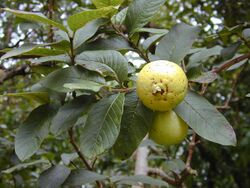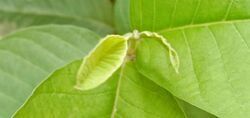Biology:Psidium
From HandWiki
Short description: Genus of flowering plants in the family Myrtaceae
| Psidium | |
|---|---|

| |
| Guava (Psidium guajava) | |
| Scientific classification | |
| Kingdom: | Plantae |
| Clade: | Tracheophytes |
| Clade: | Angiosperms |
| Clade: | Eudicots |
| Clade: | Rosids |
| Order: | Myrtales |
| Family: | Myrtaceae |
| Subfamily: | Myrtoideae |
| Tribe: | Myrteae |
| Genus: | Psidium L.[1] |
| Synonyms[2] | |
| |
Psidium is a genus of trees and shrubs in the family Myrtaceae. It is native to warmer parts of the Western Hemisphere (Mexico, Central and South America, the West Indies the Galápagos islands).[3]
Taxonomy
This genus was described first by Linnaeus in 1753.[4][5] Many of the species bear edible fruits, and for this reason several are cultivated commercially.[6] The most popularly cultivated species is the common guava, Psidium guajava.
Fossils are known from the Paleogene of Patagonia.[7]
- Species[8]
References
- ↑ "Genus: Psidium L.". Germplasm Resources Information Network. United States Department of Agriculture. 2009-01-27. http://www.ars-grin.gov/cgi-bin/npgs/html/genus.pl?10034.
- ↑ "World Checklist of Selected Plant Families". http://apps.kew.org/wcsp/synonomy.do?name_id=166596.
- ↑
- Kew World Checklist of Selected Plant Families
- Govaerts, R., Sobral, N., Ashton, P., Barrie, F., Holst, B.K., Landrum, L.L., Matsumoto, K., Fernanda Mazine, F., Nic Lughadha, E., Proença, C. & al. (2008). World Checklist of Myrtaceae: 1-455. Kew Publishing, Royal Botanic Gardens, Kew.
- Davidse, G., M. Sousa Sánchez, S. Knapp & F. Chiang Cabrera. 2009. Cucurbitaceae a Polemoniaceae. 4(1): i–xvi, 1–855. In G. Davidse, M. Sousa Sánchez, S. Knapp & F. Chiang Cabrera (eds.) Flora Mesoamericana. Universidad Nacional Autónoma de México, México.
- Landrum, L. R. & M. L. Kawasaki. 1997. The genera of Myrtaceae in Brazil: an illustrated synoptic treatment and identification keys. Brittonia 49(4): 508–536.
- Sánchez-Vindas, P. E. 1989. Flora de Nicaragua: Myrtaceae. Brenesia 31: 53–73.
- Sánchez-Vindas, P. E. 2001. Calycolpus, Eugenia, Myrcia, Myrcianthes, Myrciaria, Pimenta, Plinia, Psidium, Syzygium, Ugni. En: Stevens, W.D., C. Ulloa, A. Pool & O.M. Montiel (eds.), Flora de Nicaragua. Monographs in systematic botany from the Missouri Botanical Garden 85(2): 1566, 1570–1574, 1575–1580.
- Biota of North America Program, 2013 county distribution maps, genus Psidium
- ↑ Linnaeus, Carl von. 1753. Species Plantarum 1: 470 in Latin
- ↑ Tropicos, Psidium L.
- ↑ Jules Janick, Robert E. Paull, ed (2008). The Encyclopedia of Fruit and Nuts (illustrated ed.). CABI. ISBN 9780851996387.
- ↑ Panti, Carolina (2016-05-18). "Myrtaceae fossil leaves from the Río Turbio Formation (Middle Eocene), Santa Cruz Province, Argentina" (in en). Historical Biology 28 (4): 459–469. doi:10.1080/08912963.2014.976635. ISSN 0891-2963. http://www.tandfonline.com/doi/full/10.1080/08912963.2014.976635.
- ↑ Kew World Checklist of Selected Plant Families
- ↑ Biota of North America 2013 county distribution map, Psidium guajava
External links
Wikidata ☰ Q320179 entry
 |


